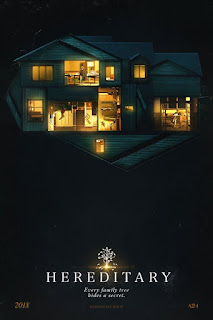Hereditary (2018)
Horror films have two main ways of scaring their audiences.
The more conventional option is to hold the audience in suspense by what they
do not see coming, scaring the audience by the surprise factor of the scare
itself. This is an easy, no-risk way of building tension that many good mainstream
horror films put to frequent but satisfying use.
The less-utilized method, and my favorite, is by telegraphing
what is going to happen and let the audience fear come from the knowledge of
the inevitable or from the danger most likely to come. This requires far more
skill to execute properly, but when done so – a la Stanley Kubrick’s immortal
classic The Shining – there is an ambiguity to the audience’s fear that
makes the whole film creepy and unsettling because there is no indication to whether
something should be feared.
Hereditary falls firmly into the latter category, and
that is why it is the most disturbing horror film I have seen in quite some
time. It uses almost no cheap tricks and little in the way of otherworldly
presences for most of its runtime, letting the tension build organically in a suitably
realistic domestic setting. It’s that last bit that makes this film more
unnerving: nearly every moment feels plausible, causing this film to feel more
immediate than most of its genre.
At the heart of Hereditary is a tragic family genre
that we see through the eyes of Annie, portrayed by a powerful Toni Collette
that shows us a character edging ever-so-closer to her breaking point. The
heartbreak that is heaped upon her throughout the film is evident in her gradually-deteriorating
mind, and Collette’s performance straddles the line perfectly between
mind-numbing insanity and maternal care and concern. There is one scene early
in the film that clues in this tension perfectly when Annie is at an emotional
support group for the grieving; that scene hooked me into Annie’s inner psyche
so deeply that I barely saw Collette as anyone but her character afterwards. Every
character in the rest of her household is written and acted with very natural
reactions to her emotional turmoil; I was especially convinced by Gabriel Byrne’s
Steve, Annie’s husband, due to his subtlety that is befitting of a character
like this one who attempts to be the calming, reasonable presence in chaotic
events like the ones in the film.
One of the more unique aspects of Hereditary is its connection
between its themes and direction. At the very start, we see a room full of dollhouse-like
dioramas that we later learn are created by Annie. That first shot pans slowly
across the room before zooming in and landing on one room that comes to life as
Peter’s bedroom. Besides the uneasiness that the steadiness and deliberate
nature of the shot create, it poses the film as an exploration into Annie’s
mind, just as the dioramas themselves function. It poses the characters as
pawns in a larger story that crosses generational divides, and writer-director
Ari Aster has a knack for how that can be conveyed visually. The family’s house
is filled with open spaces that Aster likes to almost peer into, in a similar
manner to how one would observe a dollhouse. It shows how every choice we make
fits into a mold of which we might not even be aware – a mold formed by those
who have come before us that may or may not be steering us into the same fate
as our ancestors (a fear deeply felt by Annie). It is not the first horror film
to analyze the link between the present and the past realities of a family, but
the way in which its direction contributes to that theme is distinct and
unforgettable and puts in among the best of the genre in recent years.
My recommendation: A must-watch if you want a thrill
ride.
My grade: 92/100




Comments
Post a Comment